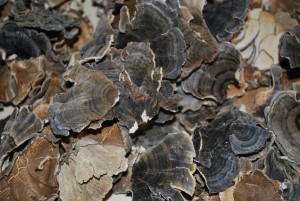Medicinal Mushrooms For Healthy Pets
Do you know a cat with herpes? The calicivirus? or FIV? Or a dog going through chemotherapy treatments? Perhaps, a bird suffering from Beak & Feather diseases? How about senior cats and dogs that need an extra boost? Well, guess what? They all may benefit from mushroom therapy.
The Fungus is Among Us
Mushrooms are older than plants. Ourasphaira giraldoe is the earliest fungus at one billion years old!
Let’s take a look at the mushroom: First, there is the T-shaped fruiting-body. Next, are the spores that fall off the fruit. And because the spores are male & female they will meet and combine to make more mushrooms. The mushroom you see above the ground is only a small part of a much bigger organism which is the mycelium, an underground network of thread-like fibers that can extend for hundreds of square miles.
There are approximately 2 million species of fungi but only 1400 are known to man. In Traditional Chinese Medicine, 300 species are used for medicine. Of that number, about 200 species have anti-tumor properties, and the most famous is Ganoderma Lucidum, known as Ling Zhi in China, or Reishi in Japan.
Mushrooms are 70% carbohydrates and 30% proteins. Unlike plants that store polysaccharides in starch, mushrooms store it in a form of glycogen (a polysaccharide that is the chief carbohydrate storage material in animals). Humans share 30% of their DNA with mushrooms which makes us more closely related to fungi than to plants. Mushrooms “breathe” in oxygen and expel carbon dioxide. Fungi protein looks more like animal protein than plant protein. Mushrooms don’t contain cholrophyll, but plants do. The defense mechanism that fungi use against other fungi infections can actually help us. When we consume medicinal mushrooms it can have a potent effect on the immune system.
Mushrooms and the Immune System
Mushrooms are immune-modulators or Biological Response Modifiers (BRMs). It’s like they have an intelligence that seems to know whether the immune system needs more stimulation or less stimulation. So, whether you have an immune deficiency or an auto-immune disease (like MS), mushrooms will work with the body. There’s a number of compounds that contribute to the BRM effect: Such as, lectins, terpenoids, polysaccharides and their peptides, and Fungal Immunodulator Proteins (FIPs).
The most well-known BRM compound that most people are familiar with are beta-glucans. Beta-glucans are largely responsible for warding off tumors, cardiovascular disease, immune deficiencies, hormonal imbalances, viral, bacterial and parasitic diseases.
Beta-glucans and complex proteins don’t directly attack virus, bacteria, or cancer cells. Instead, what they do is activate different immune pathways, such as, macro-phages, T-cells, B-cells, Natural Killer Cells, and then activate the antibodies.
Vitamin D in Mushrooms
Mushrooms contain a sterol called ergosterol (pre-Vitamin D). When mushrooms are exposed to UVB light (natural sunlight) it transforms from ergosterol into ergocalciferol which is a dietry source of Vitamin D2. Then the liver further transforms ergocalciferol into the circulating form of Vitamin D.
So, on a sunny day, just set your shiitake mushrooms on the window sill, and after a few hours, chop them up, cook them, and enjoy with your dinner.
NOTE: Cats and dogs cannot convert Vitamin D2 into Vitamin D3. They get their Vitamin D3 from other food sources, like, fish, eggs, and oragn meats.
What’s the Best Way to Consume Mushrooms?
In Asia, the traditional method to consume medicinal mushrooms is as a decoction, or a strong tea. Simmering whole dried mushrooms in hot water makes them more bioavailable and the best way to receive benefits. Those important beta-glucans are actually in the cell walls of the mushrooms, which are made of chitin and it’s only hot water that can release them. Chitin is a nitrogen-containing carbohydrate that gives strength to the fungal cell wall. It is also found in the hard exoskeleton of crustaceans and insects. Chitin decreases the digestibility of mushrooms and this is a good reason why mushrooms should always be cooked.
There are two types of medicinal mushrooms you can buy on the market: Extraction and Non-extraction. In non-extraction, the product will contain mycelium, or the mushroom fruit that has been dried and powdered and then encapsulated. Unfortunately, you won’t get any major therapeutic benefits from these products. And the bad news is: 95% of the mushroom products for sale on the market are non-extracted.
In extraction, the hot water method is used and will produce approximately 12% to 38% beta-glucans depending on the product. There are three types of extraction procedures: 1. The hot water is centrifuge off and the extracts are dehydrated, and the by-products are then encapsulated. Or, 2. there is hydro-alcohol extract where the mycelium or the mushroom fruit is tinctured in alcohol. It hasn’t been extracted in hot water but will have the same beta-glucan level as if it been prepared in hot water. In the third method, the mushroom is extracted in hot water, dried off, and the by-product is added to alcohol. The third method has the highest amount of active constituents second to a decoction.
How Do You Buy Medicinal Mushrooms?
It’s very important to know your product and read the labels. If you can, ask how the product was prepared. If you see a beta-glucan level on the label then you probably have a product that has been extracted in hot water at some point. But if you don’t see a beta-glucan level on the product’s label then it’s likely not extracted. Therefore, it will not contain enough beta-glucan.
Any mushroom supplement you purchase should list the percentage of beta-glucans present in the product ~ Christopher Hobbs, PhD, Mycologist/Botanist
Meet The Mushrooms
All fungi contain beta-glucans, which are important for supporting the immune system. If immune support is your goal, the first choice should be Turkey Tail and Reishi.
For a cancer support protocol, use mushrooms that have had clinical trials showing the strongest immune response, anti-tumor, or anti-cancer effects. Such as, Reishi, Turkey Tail, Shiitake, Chaga, and Spilt gill.
For cognition, mind and memory, the top choices are Lion’s mane and Reishi. Great for older pets! These two mushrooms are the most researched species for cognitive support.
For pets with Chronic Kidney Disease, Cordyceps and Reishi are your best bet. Cordyceps has been used in Traditional Chinese Medcine for kidney support for 2,000 years. Reishi also has kidney and liver protecting effects.
More Information:
Read about Turkey Tail Mushrooms “FDA Approves Turkey Tail Trial for Cancer Patients” HERE.
Further reading: Unlocking Fungal Fortunes: Cutting-Edge Extraction Techniques and Therapeutic Possibilties Of Mushroom Bioactive Compounds
REAL MUSHROOMS for PETS SHOP NOW












